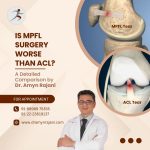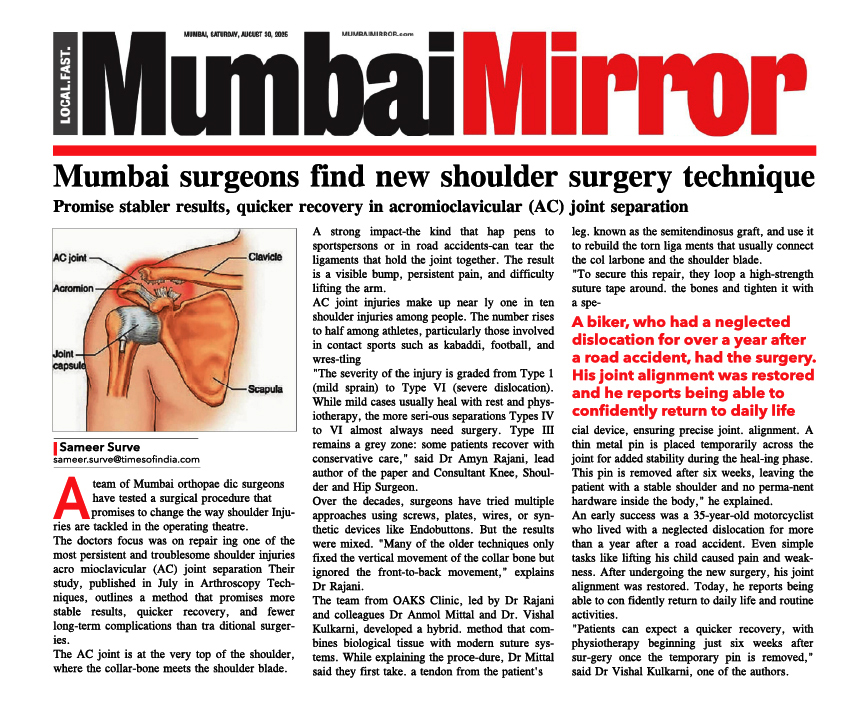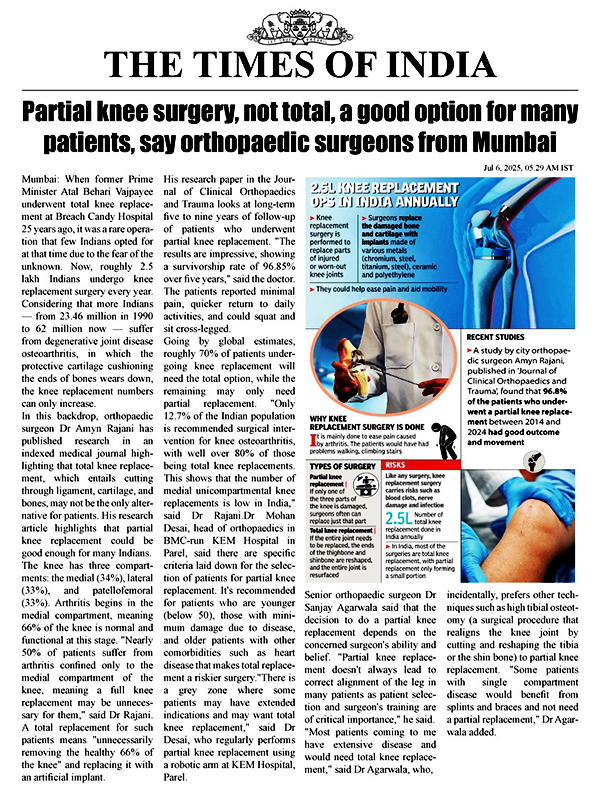Have you ever experienced a sudden, excruciating pain in your shoulder, making it hard to move your arm? If so, you might be familiar with a condition known as "frozen shoulder." In this article, we'll delve into the causes, symptoms, and treatments for frozen shoulder. We'll explore how you can find a shoulder specialist or orthopaedic doctor in Mumbai who can help you get back to pain-free mobility.
Understanding Frozen Shoulder

What is Frozen Shoulder?
Frozen shoulder, medically known as adhesive capsulitis, is a condition that affects the shoulder joint, causing pain and restricted mobility. Imagine your shoulder joint as a delicate machinery of interconnected parts. When something goes awry, it can result in a frozen shoulder.
Causes of Frozen Shoulder
- Injury and Overuse
Often, frozen shoulder can be triggered by injury or overuse. When you put excessive strain on your shoulder, it can lead to inflammation and eventually, a frozen shoulder.
- Medical Conditions
Certain medical conditions, like diabetes or heart disease, can increase the risk of developing a frozen shoulder. These underlying conditions affect the shoulder joint, making it more prone to inflammation.
- Idiopathic Causes
In some cases, the exact cause of frozen shoulder remains a mystery. This is referred to as idiopathic frozen shoulder. It's essential to consult a specialist to determine the underlying factors.
Identifying Symptoms of Frozen Shoulder
- Pain and Stiffness
The most common symptoms of frozen shoulder are pain and stiffness in the affected shoulder. It can be so severe that even simple tasks like combing your hair or reaching for something become excruciating.
- Limited Range of Motion
You'll notice a significant reduction in your shoulder's range of motion. Raising your arm, reaching behind your back, or even lifting objects can become increasingly difficult.
- Stages of Frozen Shoulder
Frozen shoulder typically progresses through three stages: freezing, frozen, and thawing. The freezing stage involves increasing pain and stiffness, leading to the frozen stage where symptoms stabilize. Eventually, you'll enter the thawing stage, where the pain gradually subsides, and mobility returns.
Diagnosing Frozen Shoulder
- Physical Examination
A shoulder specialist or orthopaedic doctor will conduct a physical examination to assess your range of motion, pain, and other symptoms. This initial examination is crucial for an accurate diagnosis.
- Imaging Tests
In some cases, your doctor may recommend imaging tests like X-rays or MRI scans to get a more detailed view of the shoulder joint and rule out other possible causes of your symptoms.
Treatment Options for Frozen Shoulder
- Physical Therapy
Physical therapy is a key part of frozen shoulder treatment. It involves exercises and stretches to improve your shoulder's mobility and alleviate pain.
- Medications
Your doctor may prescribe pain relievers and anti-inflammatory medications to manage the pain and inflammation associated with frozen shoulder.
- Injections
Corticosteroid injections can be administered directly into the shoulder joint to reduce inflammation and provide relief.
- Surgical Interventions
In severe cases, surgical procedures like shoulder arthroscopy may be necessary to release the tight joint capsule and restore mobility.
Preventing Frozen Shoulder
- Lifestyle Changes
Making lifestyle adjustments, such as maintaining a healthy weight and avoiding overexertion, can help prevent the development of frozen shoulder.
- Stretching and Exercise
Regular stretching and exercise can improve shoulder mobility and reduce the risk of frozen shoulder. Consult your doctor or physical therapist for a tailored exercise plan.
Living with Frozen Shoulder
- Coping Strategies
Living with frozen shoulder can be challenging, but there are coping strategies that can help you manage the pain and limitations. Support from family and friends is invaluable during this period.
- Support and Resources
Seek out support groups or online communities where you can connect with others who are experiencing or have experienced frozen shoulder. Sharing experiences and tips can be incredibly comforting.
Conclusion
In conclusion, frozen shoulder can be a painful and limiting condition, but with the right diagnosis and treatment, you can regain your shoulder's mobility and lead a pain-free life. Don't hesitate to reach out to a shoulder specialist in Mumbai for expert guidance.
FAQs
What is the primary cause of frozen shoulder?
The primary causes of frozen shoulder include injury, overuse, medical conditions, and, in some cases, idiopathic factors.
How long does it take to recover from frozen shoulder?
Recovery time varies from person to person, but it can take several months to a couple of years. Early diagnosis and treatment can speed up the recovery process.
Is surgery always necessary for frozen shoulder treatment?
No, surgery is not always necessary. Many cases can be managed with physical therapy, medications, and injections.
Can frozen shoulder recur after treatment?
It's possible for frozen shoulder to recur, but the chances are relatively low with proper treatment and lifestyle changes.
What are the benefits of consulting a shoulder specialist or orthopaedic doctor in Mumbai?
Consulting a shoulder specialist in Mumbai ensures an accurate diagnosis and personalized treatment plan, increasing your chances of a successful recovery.
Remember, your shoulder's health is essential, and seeking help from a professional is the first step towards a pain-free and mobile life.
Finding the Right Orthopaedic Doctor
Dr. Amyn Rajani is a renowned shoulder specialist and orthopaedic doctor in Mumbai. He is well-known for his expertise in treating a range of shoulder conditions, including frozen shoulder. Dr. Rajani has a vast experience and a track record of helping patients regain mobility and alleviate pain associated with shoulder problems.
If you are in Mumbai and dealing with issues related to your shoulder health, Dr. Amyn Rajani is a highly recommended specialist to consider for diagnosis and treatment. His knowledge and dedication to patient care have made him a trusted name in the field of orthopaedics. Don't hesitate to reach out to him for a consultation if you are experiencing shoulder pain or limited mobility.
To schedule an appointment, call on Clinic Number: 91-88989 75355 / 91-22-23619137





